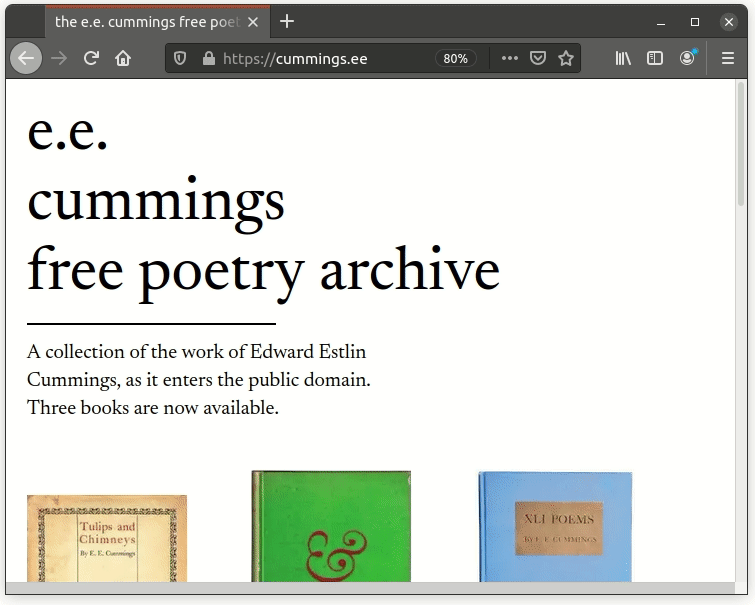
Today marks the launch of cummings.ee, a digital archive of the poetry of Edward Estlin Cummings.
The website aims to republish all of the author’s work as it gradually enters the public domain. Built using open-source software and structured data, it also offers publishers, academics, analysts, fans and artists free and easy access to the poet's body of work.
Edward Estlin Cummings, better known by the pen name E. E. Cummings, was a 20th century American author who distinguished himself among the modernists with his playful syntax and sensual subject matter. His poems, often delivered in lower case spellings, continue to enjoy a large following.
Due to the way U.S. law works, each January 1 the copyright on another year of past literature expires, making it free for others to use and build from. In the last few years, protections have expired on books published in the mid-1920's, including Cummings’s first three volumes of verse.
The author's first book of poetry, “Tulips and Chimneys,” has already been republished by the archive in full, perhaps for the first time ever online. Transcription of the books that followed — “&” and “XLI Poems” — is underway.
Volunteers interested in helping with the keypunching effort can participate via the project's GitHub repository, where all of the code that powers the site, including the database of transcriptions, is stored. Instructions on how to contribute are available there. Any errors in the digital copies can be addressed via GitHub as well.
Cummings’s fourth book, “is 5,” will free up in 2022, along with all other American works published in 1926. It will be added to the archive soon after.
The site was designed to emulate the typography and layout of books put out in the 1920's by Thomas Seltzer and Boni & Liveright, two of Cummings's earliest publishers. The font is Newsreader, a free letter-set created by Production Type.
Accommodations have been made to honor Cummings’s unconventional use of punctuation and white space. For instance, when accessing the site via a mobile phone the text is not allowed to wrap to a new line when it would mar the author's intended effect. While this violates the dominant conventions in web design, it better preserves the integrity of the original work.
The complete database of poems is available for bulk download in machine-readable formats. This should allow anyone seeking to study or republish the work to port transcriptions to a system of their choosing. It will update as new material is added.
My hope is that this will result in the poems being syndicated by popular free libraries, like Project Gutenberg, as well as other creative forms of reuse. I am particularly interested in exploring the potential for studying the corpus using the computational methods of digital humanities scholars.
The data are now free for anyone to repurpose. Those interested in a partnership effort should contact me at [email protected].
While the site is far from finished, and I welcome ideas on how it could improve, I would not have gotten this far without the valuable feedback I've received from a group of advisors. Thank you to Aaron Moe, Roi Tartakovsky, Alex Tatusian and Michael Webster, who each helped improve the effort.
The work here, cobbled together in odd hours and on weekends, is dedicated to my wife, Amanda, the most passionate Cummings fan in our family.
It's been tempting to think of this pandemic year as a long-running parenthetical. One that, if we wait long enough, will close and return the flow of our lives to normal, to what it was before.
Taking a page from one of the poet’s best works, she has reminded me to instead focus on the here and now, to not pay too much attention to “the syntax of things.” My mind may not know better, but my blood approves.